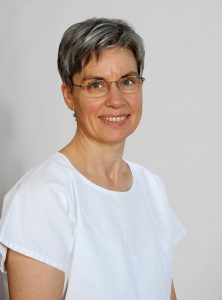This post is also available in:
 Deutsch
Deutsch
The corona crisis falls in the middle of the WHO’ s Year of the Nurse and the Midwife. With the publication of these interviews taken before the Covid-19 outbreak, we would like to express our gratitude and recognition for the nurses’ vital work.
Corinne Steinbrüchel-Boesch is a nursing expert APN in the Department of Geriatric Medicine at the University Hospital Zurich. After many years of experience in a home care organization and a Master of Science in Nursing, she added a degree as Advanced Practice Nurse (APN). Today, she works side by side with the doctors in acute geriatric care.

Interview: Ursula Reis
What is her role as a nursing expert APN in the Geriatric Clinic?
Corinne Steinbrüchel-Boesch: The Department of Geriatric Medicine was founded five years ago. I started as an APN when the ward was set up. At the beginning, we only had two beds. Today it is eighteen. I invest a lot of time and effort in inter-professional cooperation. I am often the link between nursing and the other health care professions, i.e. the medical service, physiotherapy, social services, nutrition counselling and so on. In geriatrics, inter-professionalism is vital. We offer early rehabilitation to elderly patients with several illnesses. This includes many therapies with different occupational groups.
One of my tasks is to keep track of the patients on our ward, what their nursing needs are and what the particular challenges are. When we have to decide if a patient should be transferred to our department, I take part in the consultation with the patient and the doctor and decide from a nursing perspective, whether the transfer makes sense. In our team, I am responsible for nursing expertise. The ward manager is the head of staff. Among other things, I ensure that our nurses can acquire the specific geriatric knowledge they need for their work. It is an advantage to actually work in the nursing team. In my daily work, for example, I see how well we succeed in implementing evidence-based geriatric care and where we still need to improve.
How could the Swiss healthcare system benefit if the APN was more established?
Corinne Steinbrüchel-Boesch: The APN is a chance for the chronically ill. There are a growing number of patients with multiple diseases who need several therapies at the same time. It is not enough to prescribe the treatments. An APN can attend the patients and implement the therapies. Shall I give an example? A doctor prescribes drugs to a multimorbid patient, perhaps seven or eight different ones. I will explain the patient, how he should take the drugs in the course of the day, how he can adjust the dose according to the doctor’s instructions, what needs to be taken into account, and so on. APNs can take on important roles in different areas of health care. I have a second job as an APN in a group practice. There, I also visit frail elderly patients at their home. Doctors hardly have time for house calls anymore, because their tasks are also becoming more and more specialized.
The role of APN offers an exciting opportunity for development to nurses. Previously, a nurse aspiring for more demanding work could only opt for a management position. With a degree as an APN at a university or university of applied sciences, she can now improve her professional skills and become a nursing expert working at the bedside.
I find it important that the role of the APN would be regulated in Switzerland. It is not a protected job title up until now. The job is demanding and a solid education is necessary. We should look at international standards that require a master’s degree. I do not share the fears of some politicians that a more independent status of nurses will lead to a cost explosion. A nurse with a master’s degree has an academic education and is in a position to share responsibility.
I am talking to you today on the occasion of the “Year of the Nurse and Midwife” the WHO is proclaiming worldwide for the year 2020. What do you think is needed to strengthen nursing care in Switzerland?
Corinne Steinbrüchel-Boesch: Society needs to rethink. Most people (and also the law) still see nurses as a subordinate profession to the medical doctors. However, nursing has developed enormously in recent decades. Meanwhile, we have highly qualified specialists and our own areas of focus. In order to increase acceptance, however, academic nursing not only requires research and teaching, but we should also be able to use our expertise working with patients. It is not enough if we give instructions from the back office on how to implement evidence-based care. In the USZ, too, I occasionally have to fight to be able to work in direct contact to patients.
In general, we need to invest more in training. Young professionals with a training as Fachfrau/Fachmann Gesundheit (FaGe), combined with a nursing degree of either a Höhere Fachschule (HF) or a University of Applied Sciences (FH) are well qualified and in high demand. It is a pity there are not enough positions for FaGE apprentices. Every year, many more young people leaving secondary school apply for a FaGe apprenticeship than we can take. For those who want to continue their education at HF and become a nurse, they earn too little during their training. I have seen several cases were young FaGe could not afford a HF education. Police officers, for example, earn twice as much during their training. That makes me upset.
—
Ursula Reis works as subject specialist at the Main Library – Medicine Careum
